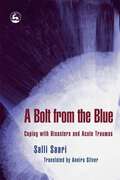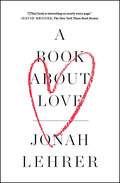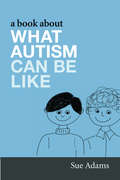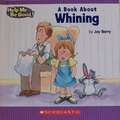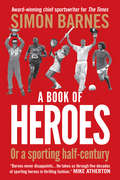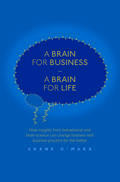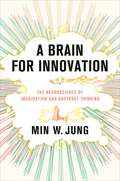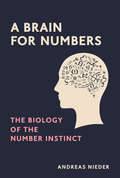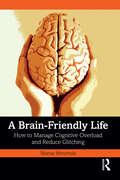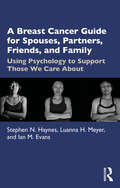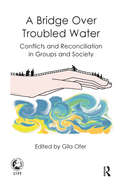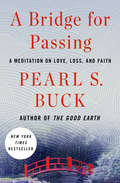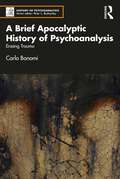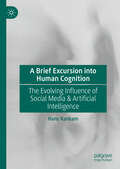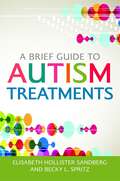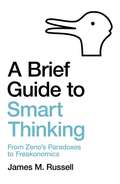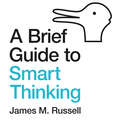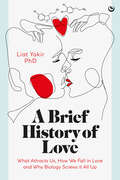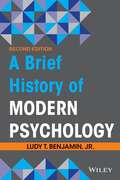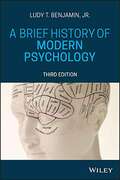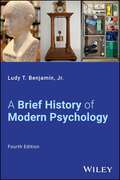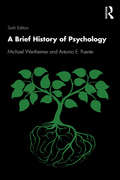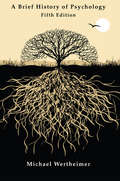- Table View
- List View
A Bolt from the Blue: Coping with Disasters and Acute Traumas
by Annira Silver Salli Saari'Saari's book discusses the impact of traumatic events and the key principles underlying acute crisis work. Case study examples are used to illustrate the main features of traumatic situations and ways of processing such experiences, as well as the practical implications for crisis support.' - Bereavement Care, Volume 26, April 2007 'The book provides a basic introduction to trauma and will be an interesting initial read for those new to this field.' - Bereavement Care, Volume 26, April 2007 'What this well written book brings is a coherent understanding of the possible effects upon us as those involved first hand, as a relative/friend of someone involved, as an observer either close by or at a distance via television or other media. I think this book offers therapists, clients, and policy makers a view of how to deal with those "bolts from the blue" with more understanding of the nature of trauma and its effects upon the individual and the community. The author has put together a book that looks at the processing of a traumatic event, the effects of it upon adults and children, how to work with a traumatised person, and the impact of interventions upon the individual.' - British Psychodrama Association Journal 'The thought I am left with after reading this book is that a basic grounding in psychological first aid should be a vital part of the "tools" of all who work in the helping professions and as a necessary part of every modern citizen's education, as is medical "first aid". - Therapy Today 'Saari examines in detail the psychological effects of traumatic events on individuals. She explains each step of the process of recovery, from the initial through lingering effects that follow the return to everyday life. The importance pf psycho-social support is also addressed. The final chapter is devoted to an examination of the efficacy of single-session debriefing in preventing traumatization.' - Book News 'This is an accessible introductory text that attempts to consider a range of issues related to personal responses to traumatic events. The author is an experienced Finnish Psychologist who obviously has extensive experience in the field of crisis response and acute trauma.' - Mental Health Practice In the wake of a number of large-scale disasters in recent years, the world is all too aware of crises but largely underprepared for the psychological repercussions of traumatic events on victims and recovery staff. Salli Saari examines in detail the psychological effect traumatic events can have on an individual, taking the reader step-by-step through each stage of the process of understanding and recovery. She also discusses the role of social support, the media and the workplace in addressing trauma, and what methods can be adopted to help victims cope after a traumatic incident. Based on work within the Finnish organized crisis care network, A Bolt from the Blue shows how crisis care can be an integral part of health care services, covering all traumatic incidents from a death in the family to major accidents and disasters. This book is an essential text for any professional who comes into contact with people affected by a traumatic experience, including psychologists, counsellors, medical doctors, social workers, nurses, pastoral carers/clergy, and students in these fields. It is also accessible enough to be of use to laymen who have encountered a traumatic experience and may need help.
A Book About Love
by Jonah Lehrer"Jonah Lehrer has a lot to offer the world....The book is interesting on nearly every page....Good writers make writing look easy, but what people like Lehrer do is not easy at all." --David Brooks, The New York Times Book Review Science writer Jonah Lehrer explores the mysterious subject of love.Weaving together scientific studies from clinical psychologists, longitudinal studies of health and happiness, historical accounts and literary depictions, child-rearing manuals, and the language of online dating sites, Jonah Lehrer's A Book About Love plumbs the most mysterious, most formative, most important impulse governing our lives. Love confuses and compels us--and it can destroy and define us. It has inspired our greatest poetry, defined our societies and our beliefs, and governs our biology. From the way infants attach to their parents, to the way we fall in love with another person, to the way some find a love for God or their pets, to the way we remember and mourn love after it ends, this book focuses on research that attempts, even in glancing ways, to deal with the long-term and the everyday. The most dangerous myth of love is that it's easy, that we fall into the feeling and then the feeling takes care of itself. While we can easily measure the dopamine that causes the initial feelings of "falling" in love, the partnerships and devotions that last decades or longer remain a mystery. This book is about that mystery. Love, Lehrer argues, is not built solely on overwhelming passion, but, fascinatingly, on a set of skills to be cultivated over a lifetime.
A Book About What Autism Can Be Like
by Donna Williams Sue AdamsChris and Andrew are very good friends, but sometimes Chris does things that Andrew doesn't understand. Chris can hear a fly buzzing when it's a mile away! But he doesn't like bright flashing lights like the ones on Andrew's favourite arcade game. Chris and Andrew have lots of fun together, but at times they laugh at completely different things - it doesn't matter though, because everyone is different, and being different can be rather cool! Chris and Andrew are here to help people understand the experiences of a child with autism, and how others can help by understanding how they are different, and recognising their many unique talents. This fully-illustrated book is targeted at boys and girls aged 5+, and also serves as an excellent starting point for family and classroom discussions.
A Book About Whining
by Joy BerryFrom the book: If you are like most parents, nothing can rankle your nerves more than a whining child--especially when the child is yours! Well, you can rest easy because help is on the way. This book can become your best defense against a whining child. The purpose of this book is to help children understand why they whine and why it is counter-productive for them to do so. In addition, it teaches children more appropriate ways to get the attention they want and need. This is an excellent book for children and parents to read together.
A Book of Dreams
by Peter ReichMemoir of Peter Reich, son of eccentric and controversial psycho-analyst and orgonomist Wilhelm Reich. Peter Reich describes his childhood through a series of dream-like flashbacks. The book focuses on his relationship with his father, the impact of his father's theories and practices on his own development as a person, and the effects of his father's persecution, imprisonment, and death.
A Book of Heroes: Or a Sporting Half-Century
by Simon BarnesSimon Barnes brings together his 50 sporting heroes of the last 50 years and looks at what it is that elevates them to a state of grace and greatness.
A Brain for Business – A Brain for Life
by Shane O'MaraBehaviour change is hard, but O’Mara shows that by adopting strategies that are well-founded in the science of brain and behaviour individuals and organisations can adapt to the demands of the modern world.The brain matters in business. The problem is that our brains have many biases, heuristics and predilections that can distort behaviour and decision making. The good news is that we know more about how these work than ever before. O’Mara’s starting point is that, as our behaviour arises from the structure and function of our brains, careful examination of a series of brain–based (‘neurocognitive’) analyses of common aspects of human behaviour relevant to business and management practice reveals lessons that can be used at work. He begins by looking at neuroplasticity and how it is enables a shift from a restrictive ‘fixed mindset’ to an enabling ‘growth mindset’. He shows how this changing mindset approach – where the focus is on task and improvements based on effort – is scalable within organisations. Next, as the brain is a living organ like the heart and lungs, O’Mara shows how to keep it physically in the best possible shape before examining how we exercise control over our behaviour, build resilience and create positive brain states. He also considers the implications for business of our brains wiring for status and illustrates how research shows that it is possible to de-bias assumptions about gender and race – and the impact that this has on performance.
A Brain for Innovation: The Neuroscience of Imagination and Abstract Thinking
by Min W. JungWhat sets humans apart from other animals? Perhaps more than anything else, it is the capacity for innovation. The accumulation of discoveries throughout history, big and small, has enabled us to build global civilizations and gain power to shape our environment. But what makes humans as a species so innovative?Min W. Jung offers a new understanding of the neural basis of innovation in terms of humans’ exceptional capacity for imagination and high-level abstraction. He provides an engaging account of recent advances in neuroscience that have shed light on the neural underpinnings of these profoundly important abilities. Jung examines key discoveries concerning the hippocampus and neural circuits that have demystified the processes underlying imagination and abstract thinking. He also considers how these capacities might have evolved as well as possible futures for intelligence.Bringing together disparate findings in neuroscience, psychology, anthropology, and artificial intelligence, A Brain for Innovation develops a unified perspective on the mechanisms of imagination, abstract thought, and creativity. Presenting cutting-edge neuroscientific research in a way that is accessible to readers without a background in the subject, this book is essential reading for anyone interested in the biological basis of one of the most fundamental aspects of human nature.
A Brain for Numbers: The Biology of the Number Instinct
by Andreas NiederHow our intuitive understanding of numbers is deeply rooted in our biology, traceable through both evolution and development. Humans' understanding of numbers is intuitive. Infants are able to estimate and calculate even before they learn the words for numbers. How have we come to possess this talent for numbers? In A Brain for Numbers, Andreas Nieder explains how our brains process numbers. He reports that numerical competency is deeply rooted in our biological ancestry; it can be traced through both the evolution of our species and the development of our individual minds. It is not, as it has been traditionally explained, based on our ability to use language. We owe our symbolic mathematical skills to the nonsymbolic numerical abilities that we inherited from our ancestors. The principles of mathematics, Nieder tells us, are reflections of the innate dispositions wired into the brain.Nieder explores how the workings of the brain give rise to numerical competence, tracing flair for numbers to dedicated “number neurons” in the brain. Drawing on a range of methods including brain imaging techniques, behavioral experiments, and twin studies, he outlines a new, integrated understanding of the talent for numbers. Along the way, he compares the numerical capabilities of humans and animals, and discusses the benefits animals reap from such a capability. He shows how the neurobiological roots of the brain's nonverbal quantification capacity are the evolutionary foundation of more elaborate numerical skills. He discusses how number signs and symbols are represented in the brain; calculation capability and the “neuromythology” of mathematical genius; the “start-up tools” for counting and developmental of dyscalculia (a number disorder analogous to the reading disorder dyslexia); and how the brain processes the abstract concept of zero.
A Brain-Friendly Life: How to Manage Cognitive Overload and Reduce Glitching
by Marisa MencholaModern life is brain-unfriendly: We are flooded with information and excessive cognitive demands, when we are often already depleted from chronic stress, sleep deprivation, and health issues. Many of us experience frequent 'glitches' or memory lapses, despite tests showing there is nothing wrong with our brains. This book provides concrete strategies, derived from neuropsychological science and clinical practice, to help people improve how they function in daily life.Menchola draws on her experience as a clinical neuropsychologist who has worked with a widely diverse group of patients, to translate the findings from highly controlled research into concrete strategies that people can implement in their messy worlds to make their days more brain-friendly. The book also provides advice on how to address those factors that drain our brain resources, and gives guidance on when and how to seek a neuropsychological evaluation.It is valuable reading for anyone experiencing frustrating cognitive problems that are not due to brain disease. It is also essential for neuropsychologists, psychologists and physicians in primary care, psychiatry, and neurology, who need a resource to offer to patients to help their healthy brains function better.
A Breast Cancer Guide For Spouses, Partners, Friends, and Family: Using Psychology to Support Those We Care About
by Stephen N. Haynes Ian M. Evans Luanna H. MeyerThis practical, science-based book focuses on helping partners, family, and friends understand breast cancer. It guides them in how to provide the best emotional and practical support when helping someone with breast cancer to cope, recover, and thrive, while maintaining their own physical and psychological health. The authors translate psychological evidence into concrete, practical advice for caregivers, validated through their first-hand experience. It also suggests ways to help someone with breast cancer make the best decisions in consultation with oncology professionals. The authors draw on well-established psychological principles relevant to social attitudes, how decisions are made, good communication skills, empathy, and how to better understand the ideas and worries experienced by women who have, or may have, breast cancer and those close to them. Each chapter includes ‘How you can Help’ sections that give specific and concrete suggestions, as well as a chapter summary of the main points along with recommendations and additional resources. It is essential reading for all those who want to help and support a loved one with breast cancer. It is also useful for training healthcare professionals in how to support partners.
A Bridge Over Troubled Water: Conflicts and Reconciliation in Groups and Society
by Gila OferThis book is a compilation of papers by different authors, among them Vamik Volkan, Robi Friedman, John Schlapobersky, Haim Weinberg, and Michael Bucholz, with a foreword by Earl Hopper and an introduction by Gila Ofer, both editor and contributor. While most of the writers are group analysts, working in the tradition of Foulkes, several others come from different though complementary perspectives, enriching the theoretical basis of the research. So, there are perspectives, inter alia, from Bion and Cortesao. The writers represent different countries and cultures, focusing on problems that are endemic to their own localities that yet have a wider and deeper resonance. We are introduced to conflict and division in Bedouin society, the Roma people living in Greece, citizens' reflective communities in Serbia, continuing territorial and ideological differences in Israel and the middle-east, and tensions of difference in the psychoanalytic community itself.
A Bridge for Passing: A Meditation on Love, Loss, and Faith (Los Jet De Plaza Y J Series)
by Pearl S. BuckThe Nobel Prize–winning and New York Times–bestselling author&’s memoir of making a movie in 1960s Japan, while mourning the loss of her husband. Pearl S. Buck&’s children&’s story, The Big Wave, about two young friends whose lives are transformed when a volcano erupts and a tidal wave engulfs their village, was eventually optioned as a movie. A Bridge for Passing narrates the resulting adventure, the story of the people involved in the movie-making process (including Polish director Tad Danielewski), their many complications while shooting, and the experience of working in Japan at a time when memories of the war remained strong. As much as all this, the book is a poignant reflection on personal crisis, and relates Buck&’s grief over the death of her husband of twenty-five years, Richard Walsh, who was also her editor. A Bridge for Passing offers an intimate view of postwar Japan mixed with Buck&’s heartrending meditation on loss and love. This ebook features an illustrated biography of Pearl S. Buck including rare images from the author&’s estate.
A Brief Apocalyptic History of Psychoanalysis: Erasing Trauma (History of Psychoanalysis)
by Carlo BonomiA Brief Apocalyptic History of Psychoanalysis returns us to the birth of psychoanalysis and the trauma of castration that is its umbilicus. The story told in this book centers on the genital mutilation endured in her childhood by Emma Eckstein, Freud’s most important patient in hisabandonment of the “seduction theory.” For both cultural and personal reasons, Freud could not recognize the traumatic nature of this “Beschneidung” (circumcision), which nevertheless aroused in him deep anguish, conflating his own circumcision, the echoes of a violently anti-Semitic environment, and conflicts with his father. Taking Freud’s countertransference to Eckstein’s trauma into account leads to a radically different understanding of the origins of psychoanalysis from the one based on the solipsistic perspective of his self-analysis. Carlo Bonomi argues that the unacknowledged trauma of circumcision was inscribed in Freud’s system of thinking as an amputated legacy from which the dreams and fantasies of his closest disciples would germinate and bloom. In particular, Sándor Ferenczi, Freud’s pupil and confidant, would help to restore this wounded body, thereby laying a new foundation for psychoanalytic theory and practice. Bonomi’s “apocalyptic” narrative will expand the conceptual horizons of psychoanalysts and psychoanalytic psychotherapists, historians of psychoanalysis, and scholars of both gender studies and Jewish studies.
A Brief Excursion into Human Cognition: The Evolving Influence of Social Media & Artificial Intelligence
by Hans KankamThis book offers a concise exploration of human cognition, charting its historical development and revealing how disciplines such as neuroscience, linguistics, anthropology, the social sciences, and behavioral economics shape our understanding. Structured as a condensed handbook, it examines the core principles defining cognition while reflecting on how these insights influence AI advancements and social media interactions. Subsequent sections highlight how evolving cognitive research, combined with rapid AI growth, is driving a paradigm shift in how we perceive ourselves and our world. Drawing on interdisciplinary perspectives, the book also explores the possible unintended consequences of integrating such knowledge into everyday life. By illuminating emerging trends and potential future directions, it equips both specialists and non-specialists with a fresh lens on how cognition shapes—and is shaped by—technology and society.
A Brief Guide to Autism Treatments
by Mary Beth Mccullough Becky L. Spritz Kirsten Brown Birtwell Susan E. Michelson Jill Myerow Bloom Kristen L. Batejan Joseph C. Viola Katherine K. Bedard Nicolas D. Taylor Elisabeth Hollister Sandberg Malorie L. DimlerThe number of intervention options available for children with autism can be overwhelming for parents. This book provides brief, user-friendly descriptions of the most commonly publicized treatments for autism, summarizing the available information in an objective and accessible way. Each short chapter covers a single treatment from Applied Behavior Analysis to Gluten-Free Casein-Free diets, as well as lesser known therapies such as Hyperbaric Oxygen Therapy. Each includes a definition and description; a summary of the prevailing information gleaned from popular press; an explanation of what the science says; and an idea of potential costs to parents and schools. This straight-talking and practical guide will allow parents of newly-diagnosed children, as well as any professionals working alongside them, to sift through the avalanche of advice and make their own informed choices about treatment.
A Brief Guide to Smart Thinking: From Zeno's Paradoxes to Freakonomics
by James M. RussellEach book is summarised to convey a brief idea of what each one has to offer the interested reader, while a 'Speed Read' for each book delivers a quick sense of what each book is like to read and a highly compressed summary of the main points of the book in question. The titles covered include thought-provoking classics on psychology, mindfulness, rationality, the brain, mathematical and economic thought and practical philosophy. The selection includes books about self-improvement as well as historically interesting accounts of how the mind works. Titles included go back as far as the Epictetus classic TheEnchiridion and Bertrand Russell's charming TheABC of Relativity, and proceed through classics such as Edward de Bono's Lateral Thinking and into the digital era with titles such as The Shallows and Big Data. The books are arranged chronologically, which draws attention to some of the interesting juxtapositions and connections between them. Some of the titles included are: Freakonomics, by Steven D. Levitt; Blink: The Power of Thinking Without Thinking, by Malcolm Gladwell; Sapiens: A Brief History of Humankind, by Yuval Noah Harari; The Organized Mind: Thinking Straight in the Age of Information Overload, by Daniel J. Levitin; The Descent of Man, by Grayson Perry; How the Mind Works, by Steven Pinker; Black Box Thinking: Why Some People Never Learn from Their Mistakes - But Some Do, by Matthew Syed; We Should All Be Feminists, by Chimamanda Ngozi Adichie; Guns, Germs, and Steel: The Fates of Human Societies, by Jared Diamond; The Black Swan: The Impact of the Highly Improbable, by Nassim Nicholas Taleb; Man's Search for Meaning, by Viktor E. Frankl; The News: A User's Manual, by Alain de Botton; Mindware: Tools for Smart Thinking, by Richard E. Nisbett; The ABC of Relativity, by Bertrand Russell; The Psychopath Test, by Jon Ronson; The Path: What Chinese Philosophers Can Teach Us About the Good Life, by Michael Puett; A Brief History of Time, by Stephen Hawking; Messy: The Power of Disorder to Transform Our Lives, by Tim Harford; Big Data: A Revolution That Will Transform How We Live, Work, and Think, by Viktor Mayer-Schönberger; Moneyball: The Art of Winning an Unfair Game, by Michael Lewis; The Survivors Club: The Secrets and Science That Could Save Your Life, by Ben Sherwood; Black Box Thinking, by Matthew Syed; Chaos: Making a New Science, by James Gleick; A Short History of Nearly Everything, by Bill Bryson; The Shallows: What the Internet Is Doing to Our Brains, by Nicholas Carr; Making Ideas Happen: Overcoming the Obstacles Between Vision and Reality, by Scott Belsky; The Enchiridion, by Epictetus; Gödel, Escher, Bach, by Douglas R. Hofstadter; What I Talk About When I Talk About Running, by Haruki Murakami; and Lateral Thinking, by Edward de Bono.
A Brief Guide to Smart Thinking: From Zeno's Paradoxes to Freakonomics
by James M. RussellEach book is summarised to convey a brief idea of what each one has to offer the interested reader, while a 'Speed Read' for each book delivers a quick sense of what each book is like to read and a highly compressed summary of the main points of the book in question. The titles covered include thought-provoking classics on psychology, mindfulness, rationality, the brain, mathematical and economic thought and practical philosophy. The selection includes books about self-improvement as well as historically interesting accounts of how the mind works. Titles included go back as far as the Epictetus classic The Enchiridion and Bertrand Russell's charming The ABC of Relativity, and proceed through classics such as Edward de Bono's Lateral Thinking and into the digital era with titles such as The Shallows and Big Data. The books are arranged chronologically, which draws attention to some of the interesting juxtapositions and connections between them. Some of the titles included are: Freakonomics, by Steven D. Levitt; Blink: The Power of Thinking Without Thinking, by Malcolm Gladwell; Sapiens: A Brief History of Humankind, by Yuval Noah Harari; The Organized Mind: Thinking Straight in the Age of Information Overload, by Daniel J. Levitin; The Descent of Man, by Grayson Perry; How the Mind Works, by Steven Pinker; Black Box Thinking: Why Some People Never Learn from Their Mistakes - But Some Do, by Matthew Syed; We Should All Be Feminists, by Chimamanda Ngozi Adichie; Guns, Germs, and Steel: The Fates of Human Societies, by Jared Diamond; The Black Swan: The Impact of the Highly Improbable, by Nassim Nicholas Taleb; Man's Search for Meaning, by Viktor E. Frankl; The News: A User's Manual, by Alain de Botton; Mindware: Tools for Smart Thinking, by Richard E. Nisbett; The ABC of Relativity, by Bertrand Russell; The Psychopath Test, by Jon Ronson; The Path: What Chinese Philosophers Can Teach Us About the Good Life, by Michael Puett; A Brief History of Time, by Stephen Hawking; Messy: The Power of Disorder to Transform Our Lives, by Tim Harford; Big Data: A Revolution That Will Transform How We Live, Work, and Think, by Viktor Mayer-Schönberger; Moneyball: The Art of Winning an Unfair Game, by Michael Lewis; The Survivors Club: The Secrets and Science That Could Save Your Life, by Ben Sherwood; Black Box Thinking, by Matthew Syed; Chaos: Making a New Science, by James Gleick; A Short History of Nearly Everything, by Bill Bryson; The Shallows: What the Internet Is Doing to Our Brains, by Nicholas Carr; Making Ideas Happen: Overcoming the Obstacles Between Vision and Reality, by Scott Belsky; The Enchiridion, by Epictetus; Gödel, Escher, Bach, by Douglas R. Hofstadter; What I Talk About When I Talk About Running, by Haruki Murakami; and Lateral Thinking, by Edward de Bono.
A Brief Guide to Smart Thinking: From Zeno’s Paradoxes to Freakonomics
by James M. RussellEach book is summarised to convey a brief idea of what each one has to offer the interested reader, while a 'Speed Read' for each book delivers a quick sense of what each book is like to read and a highly compressed summary of the main points of the book in question. The titles covered include thought-provoking classics on psychology, mindfulness, rationality, the brain, mathematical and economic thought and practical philosophy. The selection includes books about self-improvement as well as historically interesting accounts of how the mind works. Titles included go back as far as the Epictetus classic The Enchiridion and Bertrand Russell's charming The ABC of Relativity, and proceed through classics such as Edward de Bono's Lateral Thinking and into the digital era with titles such as The Shallows and Big Data. The books are arranged chronologically, which draws attention to some of the interesting juxtapositions and connections between them. Some of the titles included are: Freakonomics, by Steven D. Levitt; Blink: The Power of Thinking Without Thinking, by Malcolm Gladwell; Sapiens: A Brief History of Humankind, by Yuval Noah Harari; The Organized Mind: Thinking Straight in the Age of Information Overload, by Daniel J. Levitin; The Descent of Man, by Grayson Perry; How the Mind Works, by Steven Pinker; Black Box Thinking: Why Some People Never Learn from Their Mistakes - But Some Do, by Matthew Syed; We Should All Be Feminists, by Chimamanda Ngozi Adichie; Guns, Germs, and Steel: The Fates of Human Societies, by Jared Diamond; The Black Swan: The Impact of the Highly Improbable, by Nassim Nicholas Taleb; Man's Search for Meaning, by Viktor E. Frankl; The News: A User's Manual, by Alain de Botton; Mindware: Tools for Smart Thinking, by Richard E. Nisbett; The ABC of Relativity, by Bertrand Russell; The Psychopath Test, by Jon Ronson; The Path: What Chinese Philosophers Can Teach Us About the Good Life, by Michael Puett; A Brief History of Time, by Stephen Hawking; Messy: The Power of Disorder to Transform Our Lives, by Tim Harford; Big Data: A Revolution That Will Transform How We Live, Work, and Think, by Viktor Mayer-Schönberger; Moneyball: The Art of Winning an Unfair Game, by Michael Lewis; The Survivors Club: The Secrets and Science That Could Save Your Life, by Ben Sherwood; Black Box Thinking, by Matthew Syed; Chaos: Making a New Science, by James Gleick; A Short History of Nearly Everything, by Bill Bryson; The Shallows: What the Internet Is Doing to Our Brains, by Nicholas Carr; Making Ideas Happen: Overcoming the Obstacles Between Vision and Reality, by Scott Belsky; The Enchiridion, by Epictetus; Gödel, Escher, Bach, by Douglas R. Hofstadter; What I Talk About When I Talk About Running, by Haruki Murakami; and Lateral Thinking, by Edward de Bono.
A Brief History of Love: What Attracts Us, How We Fall in Love and Why Biology Screws it All Up
by Liat YakirIs love about chemistry or do biology, evolution and psychology all have a part to play?Love is one of the most complex and confusing emotions in the human experience. It consumes so much of our lives and yet we don&’t truly understand it – what it is on a biological, chemical and evolutionary level. This book takes you on a fascinating journey to explore the science of love, looking closely at the interplay between genes, hormones, emotions and relationships.Discover everything you need to know about why you are attracted to certain people, the brain&’s role in your emotions, how to pick &“the one&” and how to preserve that love over time. Learn how to have better, healthier and more loving relationships by understanding the inner workings of love in your body.
A Brief History of Modern Psychology
by Ludy T. BenjaminIn A Brief History of Modern Psychology 2nd Edition, Ludy Benjamin, a leading historian in the field, discusses the history of both the science and the practice of psychology since the establishment of the first experimental psychology laboratory in 1879. In engaging prose, this book weaves together the historical and disciplinary context that will help readers to better understand the richness and complexity of contemporary psychology. In the Second Edition, personality, social, and developmental psychology are expanded upon, providing balanced coverage of these three topics.
A Brief History of Modern Psychology
by Ludy T. BenjaminA Brief History of Modern Psychology offers a concise account of the evolution of this dynamic field―from early pioneers of psychological theory to cutting-edge contemporary applications. In this revised third edition, leading scholar Ludy Benjamin surveys the significant figures, concepts, and schools of thought that have shaped modern psychology. Engaging and accessible narrative provides readers historical and disciplinary context to modern psychology and encourages further investigation of the topics and individuals presented. This book provides a solid foundational knowledge of psychology’s past, covering essential areas including prescientific psychology, physiology and psychophysics, early schools of German and American psychology, and the origins of applied psychology, behaviorism, and psychoanalysis. Exploration of 20th century and contemporary developments, including the emergence of clinical and cognitive psychology, ensures a complete overview of the field. <p><p> The author integrates biographical information on widely recognized innovators such as Carl Jung, Wilhelm Wundt, and B.F. Skinner with lesser known figures including E.B. Titchener, Mary Calkins, and Leta Hollingworth. This personalistic approach to history allows readers to understand the theories, research, and practices of the individuals who laid the foundation to modern psychology.
A Brief History of Modern Psychology
by Ludy T. Benjamin Jr.A Brief History of Modern Psychology is a clear and engaging account of scientific psychology’s origins, evolution, and related professional practice. With a reader-friendly narrative style, author Ludy Benjamin provides the historical and disciplinary context needed to appreciate the richness and complexity of contemporary psychology. Concise chapters apply biographical and historical context to individual psychologists while exploring pre-scientific psychology, physiology and psychophysics, early schools of German and American psychology, applied psychology, behaviorism, psychoanalysis, cognitive psychology, and more. Thoroughly revised and updated to reflect current scholarship in the field, the fourth edition of A Brief History of Modern Psychology contains new examinations of the connections between phrenology and modern neuroscience, the dangers and proliferation of bogus therapies, industrial psychology, eugenics, intelligence testing, sport psychology, and more. Expanded coverage includes Hermann von Helmholtz’s research on the speed of nerve conductance, Christine Ladd-Franklin’s theory of color vision, Charles Darwin’s theory of natural selection and its widespread influence on psychology, Sigmund Freud’s impact in America, Charles Henry Turner’s pioneering work in comparative psychology, and Evelyn Hooker’s work that led to the removal of “homosexuality” as a mental disorder from the DSM.
A Brief History of Psychology
by Michael Wertheimer Antonio E. PuenteThis brief, inexpensive text offers great flexibility in teaching the history of psychology. Used as a stand-alone text or with readers, this engaging book is noted for its analysis of the scientific and philosophical emergence of the field as well as its coverage of contemporary psychology and emerging areas. Readers appreciate the book's balanced coverage of experimental, applied, and clinical psychology, as well as the clear and succinct presentation of the field's major events and schools of thought. The sixth edition features an expanded pedagogical program with bolded terms, a complete glossary, more illustrations, and web-based instructional materials including PowerPoints, a test bank, discussion questions, and more. Special emphasis has also been placed on the role of the American Psychological Association (APA) in the history of psychology.Extensively updated throughout, the sixth edition features: A revised final chapter with a current analysis of the state of the field, including the growth of the APA as well as specialized organizations that promote the science and profession of psychology, and the push to influence policies that address global challenges, such as environmental sustainability, intergroup conflict, health disparities, and the population explosion. A discussion of the growth in the number and role of women and ethnic minorities in psychology, and the promotion of diversity across both demographic and intellectual perspectives. Recent developments in the growth of neuroscience, cognitive science, artificial intelligence, and the diversification and internationalization of psychology. Portraits of some major figures in the history of psychology, including psychology’s first Nobel Prize winners. Recent and evolving changes in the practice of psychology, including more emphasis on "evidence-based practice," prescription privileges, and the emergence of the importance of psychological practice in health care. Recent changes in the APA, including new divisions and new elected officials and its emerging focus on advocacy. Used independently or as a supplement with readers, this brief text is intended for undergraduate and graduate courses on the history of psychology. Due to its brevity and engaging style, the book can be used in introductory courses to introduce students to the field. The enormous index and substantial glossary make this volume a useful desk reference for psychology and related disciplines.
A Brief History of Psychology
by Michael WertheimerThis brief, inexpensive text offers the utmost in flexibility in teaching the history of psychology. Used as a stand-alone text or with readers, this engaging book is noted for its analysis of the scientific and philosophical emergence of the field. Readers appreciate the book’s balanced coverage of experimental, applied, and clinical psychology, as well as the clear and succinct presentation of the field’s major events and schools of thought. This edition features an expanded pedagogical program with bolded terms, a complete glossary, more illustrations, and web-based instructional materials including Power Points, a test bank, discussion questions, and more. Extensively updated throughout, this edition features: A new final chapter with a current analysis of the state of the field including the growth of specialized organizations that promote the science of psychology and the push to influence policies that address global challenges such as environmental sustainability, intergroup conflict, health disparities, and the population explosion. A discussion of the growth in the number and role of women in psychology and the promotion of diversity initiatives related to ethnicity, gender, age, and sexual orientation. Recent developments in the growth of neuroscience, cognitive science, and the diversification of psychology. Portraits of some major figures in the history of psychology. Recent changes in the practice of psychology including more emphasis on "evidence-based practice," prescription privileges, and the application of psychological principles to industrial and engineering psychology. Recent changes in the APA including new divisions and new elected officials. Used independently or as a supplement with readers, this brief text is intended for undergraduate and graduate courses on the history of psychology. Due to its brevity and engaging style, the book is often used in introductory courses to introduce students to the field. The enormous index and substantial glossary make this volume a useful desk reference for the entire field.
